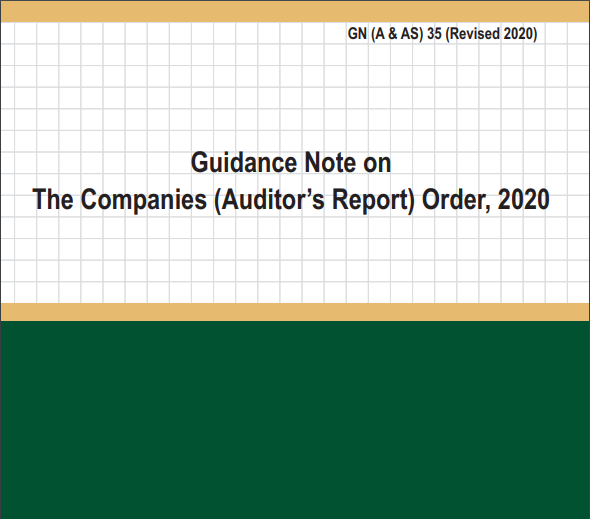Guidance Note on The Companies (Auditor’s Report) Order, 2020: ICAI
Guidance Note on The Companies (Auditor’s Report) Order, 2020
Introduction
1. The Central Government, in the exercise of the powers, conferred, under sub-section (11) of section 143 of the Companies Act, 2013 (hereinafter referred to as “the Act”), issued the Companies (Auditor’s Report) Order, 2020, (CARO 2020/ “the Order”) vide Order number S.O. 849(E) dated 25th February 2020. CARO 2020 was initially applicable for audits of the financial year 2019-20 and onwards. Subsequently, vide notification dated 24th March 2020, its applicability has been deferred by one year. Accordingly, CARO 2020 is applicable for audits of the financial year 2020-21 and onwards. CARO 2020 contains certain matters on which the auditors of companies (except auditors of those categories of companies which are specifically exempted under the Order) have to make a statement in their audit reports. The text of the CARO 2020 is given in Appendix I to this Guidance Note.
2. This Order is in supersession of the earlier Order issued in 2016, viz., the Companies (Auditor’s Report) Order, 2016 (CARO 2016). Appendix II to this Guidance Note contains a clause-by-clause comparison of the reporting requirements of the Order and the CARO 2016.
3. The purpose of this Guidance Note is to enable the auditors to comply with the reporting requirements of the Order. It should, however, be noted that the guidance contained in this Guidance Note is not intended to be exhaustive and the auditors should exercise their professional judgment and experience on various matters on which they are required to report under the Order.
Related Topic:
CARO 2003, 2015, 2016 and 2020 comparison table
Appendix III to this Guidance Note contains the definitions of important terms used in this Guidance Note. Appendix IV to this Guidance Note contains a list of important sections/ rules/ regulations/ statutes referred to in this Guidance Note.
General Provisions Regarding Auditor’s Report
4. The requirements of the Order are supplemental to the existing provisions of section 143 of the Act regarding the auditor’s report. In this regard, the following points may be noted:
(i) the provisions of sub-sections (1), (2), & (3) of section 143 are applicable to all companies (other than clause (i) of subsection (3)) while the Order exempts certain categories of companies from its application; and
(ii) the provisions of sub-section (1) of section 143 require the auditor to make certain specific inquiries during the course of his audit. The auditor is, however, not required to report on any of the matters specified in that sub-section unless he has any special comments to make on the said matters. In other words, if the auditor is satisfied with the results of his inquiries, he has no further duty to report that he is so satisfied. The Order, on the other hand, requires a statement on each of the matters specified therein, as applicable to the company.
5. Another question that arises is about the status of the Order vis-a-vis the directions given by the Comptroller and Auditor General of India under section 143(5) of the Act. In this regard, it may be noted that the Order is supplemental to the directions given by the Comptroller and Auditor General of India under section 143(5) of the Act in respect of government companies. These directions continue to be in force. Therefore, in respect of government companies, the matters specified in the Order will form part of the auditor’s report submitted to the members and the replies to the aforesaid questionnaire issued by the Comptroller and Auditor General of India will be governed by the requirements of section 143(5) of the Act.
6. The Order is not intended to limit the duties and responsibilities of auditors but only requires a statement to be included in the audit report in respect of the matters specified therein.
Related Topic:
CARO:Companies (Auditor’s Report) Order, 2016
Applicability of the Order
Companies Covered by the Order
7. The Order applies to all companies except certain categories of companies specifically exempted from the application of the Order.
8. The Order also applies to foreign companies as defined in clause (42) of section 2 of the Act. According to the aforesaid section, a “foreign company” means:
“Any company or body corporate incorporated outside India which –
(a) has a place of business in India whether by itself or through an agent, physically or through electronic mode; and
(b) conducts any business activity in India in any other manner.”
9. In the case of a foreign company, wherever under any of the provisions of the Act, an audit of financial statements under Chapter X of the Act is required to be carried out, the Order would be applicable.
10. The Order is also applicable to the audits of the branch(es) of a company since sub-section 8 of section 143 of the Act read with Rule 12 of the Companies (Audit and Auditors) Rules, 2014 clearly specifies that a branch auditor has the same duties in respect of audit as the company’s auditor. It is, therefore, necessary that the report submitted by the branch auditor (including auditor of a foreign branch) contains a statement on all the matters specified in the Order, as applicable to the company, except where the company is exempt from the applicability of the Order, to enable the company’s auditor to consider the same while complying with the provisions of the Order.
The Order is also applicable to the audits of the project office/liaison office established by a company outside India, to whom the Order applies. In case the company has appointed separate auditors for the project office/liaison office, the auditor of the company should seek a report from the said auditors which contains a statement on all the matters specified in the Order, as applicable to the company, except where the company is exempt from the applicability of the Order.
Companies Not Covered by Order
11. The Order provides that it shall not apply to:
(i) a banking company as defined in clause (c) of section 5 of the Banking Regulation Act, 1949;
(ii) an insurance company as defined under the Insurance Act, 1938;
(iii) a company licensed to operate under section 8 of the Act;
(iv) a one-person company as defined under clause (62) of section 2 of the Act and a small company as defined under clause (85) of section 2 of the Act; and
(v) a private limited company, not being a subsidiary or holding company of a public company, having a paid-up capital and reserves and surplus not more than one crore rupees as on the balance sheet date and which does not have total borrowings exceeding one crore rupees from any bank or financial institution at any point of time during the financial year and which does not have a total revenue as disclosed in Schedule III to the Act, (including revenue from discontinuing operations) exceeding ten crores rupees during the financial year as per the financial statements.
12. The Order specifically exempts banking companies, insurance companies, and companies that have been licensed to operate under section 8 of the Act. The Order also exempts a one-person company and a small company from its application. The applicability of the Order would be based on the status of the company as at the balance sheet date. It may also be noted that in case a company is covered under the definition of a small company, it will remain exempt from the applicability of the Order even if it falls under any of the criteria specified for a private company.
13. The specific exemption under the Order is given to companies licensed to operate under section 8 of the Act. However, it would appear that in view of the provisions of section 465 of the Act, the exemption would also extend to companies licensed to operate under section 25 of the Companies Act, 1956.
14. A private limited company, in order to be exempt from the applicability of the Order, must satisfy all the conditions mentioned above collectively. In other words, even if one of the conditions is not satisfied, the Order would be applicable to the company.
15. In case a company converts into a limited liability partnership or partnership or to any other constitution (which is not governed by the Act) or converts to any constitution which is exempted from the application of the Order, in that situation, the Order would not be applicable.
16. The Order will not be applicable to Infrastructure Investment Trusts and Real Estate Investment Trusts since they are trusts which are governed by Securities and Exchange Board of India (Infrastructure Investment Trusts) Regulations, 2014 and Securities and Exchange Board of India (Real Estate Investment Trusts) Regulations, 2014, respectively. However, the Order will be applicable to the companies in which these trusts have investment if such companies satisfy the applicability criteria prescribed in the Order. Accordingly, the Order is not applicable to the consolidated trust financial statements even though there are companies forming part of the consolidated trust financial statements which individually may have the Order applicable to them.
Private Limited Company
17. The term “private limited company”, as used in the Order, should be construed to mean a company registered as a “private company” [as defined in clause (68) of section 2 of the Act].
Paid-up Capital and Reserves and Surplus
18. Clause (64) of section 2 of the Act defines the term “paid-up share capital” as such aggregate amount of money credited as paid-up as is equivalent to the amount received as paid up in respect of shares issued and also includes any amount credited as paid up in respect of shares of the company but does not include any other amount received in respect of such shares, by whatever name called.
While calculating the paid-up capital, the amount of calls unpaid should be deducted from and the amount originally paid-up on forfeited shares should be added to the figure of paid-up capital. In order to maintain consistency with the Schedule III (Division II) of the Act classification, share application money received should not be considered as part of the paid-up capital. Convertible instruments whether optionally or fully convertible should be considered in paid-up share capital only once the actual shares are issued by the company.
The “Glossary of Terms Used in Financial Statements” issued by the Research Committee of ICAI defines the term “reserve” as, “the portion of earnings, receipts or other surpluses of an enterprise (whether capital or revenue) appropriated by the management for a general or a specific purpose other than a provision for depreciation or diminution in the value of assets or for a known liability”.
19. As per Schedule III (Division I) to the Act (Financial statements for a company whose financial statements are required to comply with the Companies (Accounting Standards) Rules, 2006), “Reserves & Surplus” consists of:-
- Capital Reserves;
- Capital Redemption Reserve;
- Securities Premium;
- Debenture Redemption Reserve; Revaluation Reserve;
- Share Options Outstanding Account;
- Other Reserves–(specify the nature and purpose of each reserve and the amount in respect thereof);
- Surplus i.e., balance in statement of profit and loss.
Read & Download the full Copy in pdf:
If you already have a premium membership, Sign In.
 ConsultEase Administrator
ConsultEase Administrator
Consultant
Faridabad, India
As a Consultease Administrator, I'm responsible for the smooth administration of our portal. Reach out to me in case you need help.













